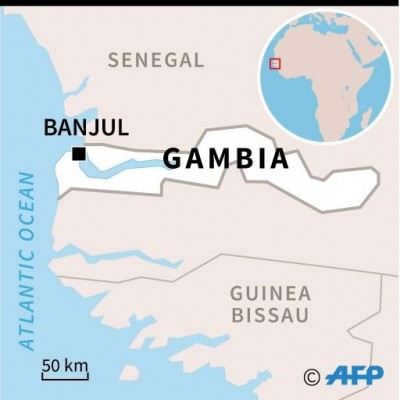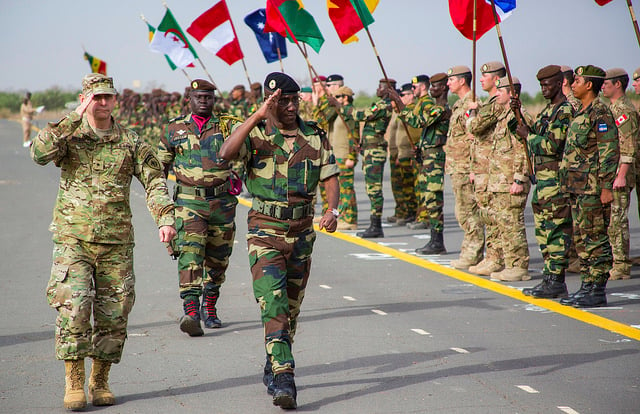USAFRICOM Military Intervention in Gambia Makes Good on Pentagon “Joint Operations”

United States Africa Command has been planning an intervention in West Africa for years
A major military invasion of the small West African state of Gambia is taking place as troops from neighboring Senegal are entering the agricultural country.
Gambian President Yahya Jammeh had been granted a three month extension by the parliament to remain in office in the midst of a controversy surrounding the outcome of a recent national election.
Jammeh has rejected calls from the regional Economic Community of West African States (ECOWAS) to resign from office immediately describing their threats of an occupation as unwarranted interference in the country’s internal affairs. The president has declared a state of emergency signaling his willingness to maintain the existing position.
At the Gambian embassy in Dakar, Senegal, the proclaimed winner of the November elections, businessman Adama Barrow, was sworn in as president. Although Barrow is saying that he is the legitimate head-of-state for Gambia, nevertheless, he is not even residing inside the small nation.
Mauritanian President Mohamed Ould Abdel Aziz visited the capital of Banjul on January 18 in another effort to persuade Jammeh to relinquish office. The talks at the presidential palace fueled speculation that Jammeh is being pressured to leave the country to settle in Morocco or Nigeria.
Nonetheless, there were no guarantees mentioned which would indicate whether he would be subjected to extradition back to Gambia or to Europe as was done to former Liberian President Charles Taylor in 2003. After an ECOWAS intervention, Taylor was sent to Nigeria for a brief period and then in contravention to the agreement, he later wound up in The Hague for a Special Tribunal on the War in Sierra Leone.
Thousands of tourists and other guests in Gambia have been seen evacuating the country. These developments followed a travel advisory issued by the British government, the former colonial power in Gambia.
According to the Independent newspaper,
“The British High Commission in the capital, Banjul, believes that the volatile situation ‘could result in Banjul International Airport being closed at short notice’. Rather than risking UK holidaymakers being stranded in a country where the only other way out involved a long and difficult overland journey via Senegal, the decision was taken to put The Gambia on the ‘no-go’ list.”
This important notice by London reveals the western imperialist involvement in the Gambian crisis. In addition to the British, the outgoing administration of President Barack Obama signed in 2016 a renewed military cooperation agreement with Senegalese President Macky Sall.
Global Risks Insights website notes that: “With the defense cooperation deal signed by the U.S. and Senegal last week (May 19), the U.S. is increasing its military foothold in Africa. It can be argued that this is a new direction in the Africa policy of the Obama administration and a response to China’s new naval base in Djibouti. Last week the U.S. and Senegal signed a defense cooperation deal. The deal is an upgrade of an existing agreement dating from 2001, and only entails increased access for U.S. military deployment in case of humanitarian crises, such as the Ebola crisis, and to contribute to the battle against terrorist groups in the region. However, it can also be interpreted as a new direction and strategy of the U.S. Africa Command, AFRICOM.” (globalriskinsights.com)
Gambia Intervention a Culmination of AFRICOM Policy
There have been numerous joint military exercises between several West African states and AFRICOM over the last several years. These operations are said to be in preparation for humanitarian crises along with counter measures against “Islamic Terrorism.” However, the discovery of vast reservoirs of natural resources including oil, natural gas and uranium underlies the enhanced interests in African affairs by Washington and London.
It is also necessary to view the escalating imperialist militarism in Africa within the context of growing cooperation between African Union (AU) member-states and the People’s Republic of China, among other countries. The European Union (EU) states and North American governments are seeking to maintain their dominance on the continent and consider events in West Africa as being significant in these strategic imperatives.
Gambia is small almost completely landlocked country on the Atlantic coast. The economy is based upon agricultural production, fishing and tourism. A travel advisory issued by London only serves to undermine the national economy even further amid the character of reports coming out the country from western media sources.
86 percent of the foreign trade by Gambia is conducted with Britain and EU states. Tourism constitutes at least 40 percent of its hard currency earnings. Consequently, the imperialist governments are in a position to place serious strains on the Jammeh administration.
Barrow, who represented eight different opposition parties in the November elections, is framed by western corporate and government-controlled press agencies as a “businessman.” The military background of Jammeh and his seizure of power in 1994 are often cited in these media accounts assessing the character of the incumbent administration.
Many of the same states which are today demanding the resignation of Jammeh, have themselves, experienced numerous coups carried out by the military. Others have been involved in counter-insurgency operations within their own borders that remained absent of uninvited outside interference by neighboring states. Therefore, it seems that there are imperialist forces involved in this operation.
Joint Naval and Ground Operations Are Standard Practice in West Africa
The rapidly increasing role of Pentagon, Central Intelligence Agency (CIA) and U.S. State Department personnel embedded within African military structures are well-known and publicized developments on the continent. Websites and press releases issued by the U.S. Africa Command (AFRICOM), the U.S. Army Africa (USARAF), NATO, etc. frequently report on these joint maneuvers.
Operation Flintlock, which is coordinated by the U.S. Army Africa (USARAF), has been conducted in Senegal over the last few years. Washington attempts to project these operations as merely training exercises requested by the African states. Nevertheless, when interventions such as the developments in Gambia manifest, it is quite obvious that they are part and parcel of a neo-colonialist project to guarantee the dominance of the Pentagon in regional military affairs.
A post on the USARAF website from 2016 notes:
“U.S. Army Brig. Gen. Donald C. Bolduc, Special Operations Command-Africa commander, joined leadership from last year’s Flintlock exercise, hosted by Chad, and Senegalese leadership in exchanging the Flintlock ceremonial flag, signifying the new host nation accepting the lead role for Flintlock 16. This year’s Senegalese-led exercise spans across several locations within the country as well as outposts in Mauritania.”
This same press release continues saying explicitly:
“’Flintlock is more than a military exercise, we are training together to increase our interoperability and collaboration to counter today’s threats,’ said Brig. Gen. Bolduc. ‘Flintlock contributes to strengthening security ties, promoting shared values and setting conditions for economic growth.’ Flintlock 2016 marks the third time the exercise has been hosted by Senegal.”
Nonetheless, even proponents of this strategy which has characterized U.S. foreign policy towards the continent during the course of the last two administrations through deepening military and intelligence penetration of African nation-states, are questioning its effectiveness related to the stated objectives of enhancing the security capacity of these same neo-colonial dominated regional governments. In states such as Mali, where the Pentagon has trained and financed defense forces, military coups have been led by those who have directly participated in army schools in the U.S.
World Politics Review published an article on November 12, 2015 by Peter Dorrie emphasizing that Washington’s policy:
“has led to some strange bedfellows. Cameroon’s president, Paul Biya, has been in power 33 years, while Djibouti’s Ismail Omar Guelleh and Uganda’s Yoweri Museveni also show no signs of stepping down after decades in power. Of the 10 countries hosting U.S. surveillance assets, one is classified as ‘worst of the worst, five as ‘not free’ and four as ‘partly free’ by Freedom House’s 2015 Freedom in the World index. U.S. military assistance in the form of training and materiel is also going to regimes that routinely use their security forces against their population, contributing to the drivers of terrorism. To make things worse, many of these countries could actually finance these programs themselves, if only their corrupt political elites did not squander their national wealth.” (www.worldpoliticsreview.com)
A coalition of these same states is now entering the Gambia, a nation which posed no threat to the regional stability of West Africa. Until the AU member-states develop a foreign policy that is genuinely independent of imperialism these ongoing military interventions will continue to destabilize the continent and foster its underdevelopment.


